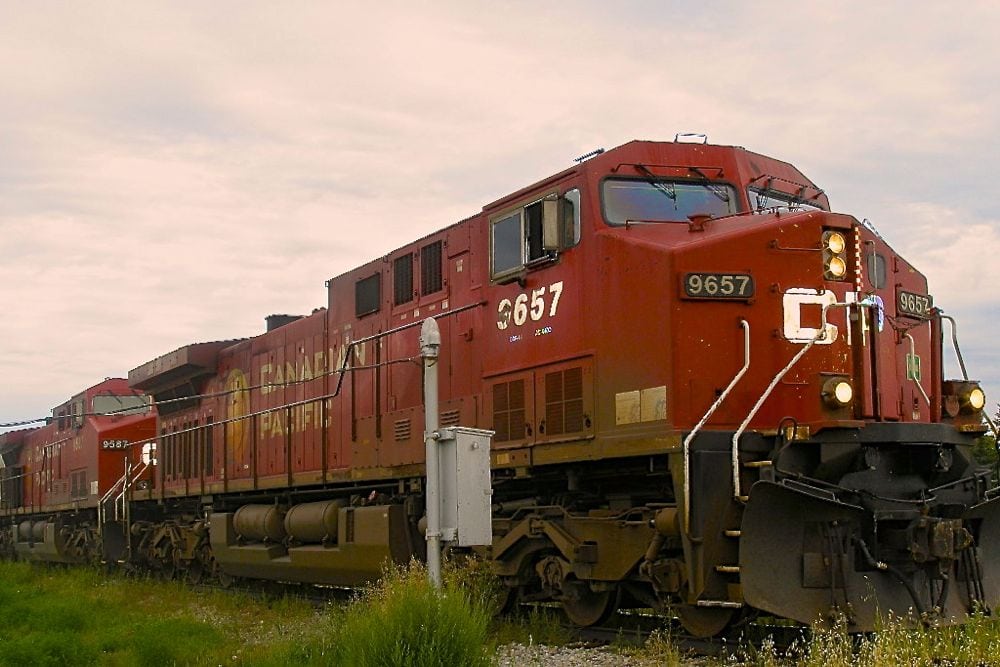CP to lock out engineers, conductors starting Sunday
'Cannot prolong the uncertainty,' CEO says
By Dave Bedard
| 4 min read

(File photo by Dave Bedard)
Canadian Pacific Railway has served its unionized engineers, conductors and train and yard service staff with notice of a lockout to start just after midnight ET on Sunday, unless the company and union agree on a new labour deal by then.
Calgary-based CP and the Teamsters Canada Rail Conference (TCRC), which represents about 3,000 CP workers across the country, have been in talks toward a new collective bargaining agreement to replace a contract that expired at the end of 2021.
Disputes over issues including pensions, wages and benefits escalated earlier this month when the TCRC announced its members had voted almost 97 per cent in favour of strike action.
A strike thus could have begun as early as Wednesday if the TCRC had served 72 hours’ notice beforehand, but CP instead took the first step Wednesday with its lockout notice.
The lockout will take effect “if the union leadership and the company are unable to come to a negotiated settlement or agree to binding arbitration,” the company said in a release.
CP “simply cannot prolong for weeks or months the uncertainty associated with a potential labour disruption,” CEO Keith Creel said in the same release.
“It was well known that CP was going to force a work stoppage and lock out our members. They have done just that,” TCRC spokesperson Dave Fulton said late Wednesday in a separate release.
During bargaining, he said, CP “continues to dismiss our members’ demands and are unwilling to negotiate the issues they have created.”
CP and Teamster brass have been meeting “daily” with federal mediators over the past week but “our positions remain far apart,” the company said.
Those talks led CP to make a new offer Tuesday which “addressed a total of 26 outstanding issues between the parties, including an offer to resolve the TCRC’s key issues of wages, benefits and pensions through final and binding arbitration,” but the Teamsters on Wednesday rejected that offer, the company said.
Instead, CP said, the TCRC “continues to table additional work rule demands” and has made “an even more onerous pension demand” which would “be even more destabilizing to the pension plan for all of CP’s unionized employees, not just the 10 percent who are TCRC members.”
The Teamsters, in a separate statement Tuesday about pension matters, countered that their request “is by no means unreasonable” and calls for what the union said would be its first pension cap increase in 10 years.
The union said its pension request “does not negatively impact other members of the plan or the overall sustainability of the plan. In fact, several other unions have already received pension improvements similar to our request.”
‘Terrible to catastrophic’
All that said, federal Labour Minister Seamus O’Regan on Wednesday said he and Transport Minister Omar Alghabra “are encouraged to see that both parties are still negotiating” and urge both parties to “consider making the compromises necessary to reach a deal that is fair for workers and the employer.”
O’Regan said he and Alghabra have said as much to the company and union directly, adding that the Federal Mediation and Conciliation Service “remains with them at the table to assist them in their negotiations.”
O’Regan, in his statement, said the ministers “understand the impacts of a potential work stoppage and are monitoring the situation closely” but did not mention the possibility of ending the dispute through federal legislation.
The government, he said, “respects and has faith in the collective bargaining process, because we know that the best deals are the ones reached by the parties at the bargaining table.”
The Western Grain Elevators Association, which represents the Canadian Prairies’ major bulk grain handlers, said Tuesday it’s “imploring” CP and the TCRC to either reach a deal or agree to binding arbitration.
Otherwise, the WGEA said, it’s “imperative that the federal government step in and impose a process for a fair and reasonable resolution.”
“Despite this year’s 35 per cent smaller than average crop due to drought, the railways have struggled to meet even half of our weekly demands for rail service the past few months,” WGEA executive director Wade Sobkowich said in the group’s release Tuesday.
A work stoppage at CP now, he said, “would take the situation from terrible to catastrophic, crippling the flow of goods throughout the Canadian economy.”
Western Canada’s drought-dented feed grain supplies have also left the region’s livestock feeders more reliant on CP this year to rail U.S. corn into the region.
A railway work stoppage now “will devastate the livestock industry that is reliant on U.S. corn to feed over (one million) animals,” the Saskatchewan Stock Growers said on Twitter Wednesday following CP’s lockout notice.
Fertilizer Canada, in a separate statement last Friday, warned that about 75 per cent of all fertilizer produced and used in Canada is moved by rail, with “no other alternative transportation method that currently has capacity or can be brought online in time to mitigate the impact of the work stoppage.” — Glacier FarmMedia Network


